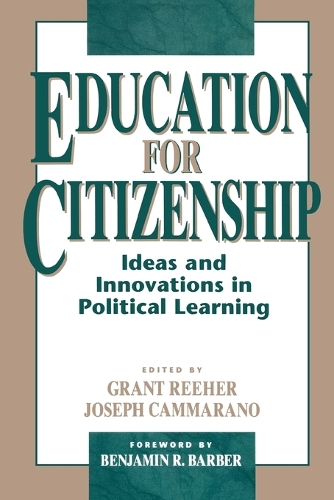
Education for Citizenship: Ideas and Innovations in Political Learning
(Paperback)
Publishing Details
Education for Citizenship: Ideas and Innovations in Political Learning
By (Author) Grant Reeher
Edited by Joseph Cammarano
Foreword by Benjamin R. Barber
Contributions by William Ball
Contributions by Richard Battistoni
Contributions by Joseph Cammarano
Contributions by Kimberley P. Canfield
Contributions by James D. Chesney
Contributions by William D. Coplin
Contributions by Otto Feinstein
Bloomsbury Publishing PLC
Rowman & Littlefield Publishers
29th August 1997
United States
Classifications
Tertiary Education
Non Fiction
Education / Educational sciences / Pedagogy
Political structures / systems: democracy
323.6071
Physical Properties
Paperback
240
Width 165mm, Height 229mm, Spine 22mm
399g
Description
This book addresses the challenge of education for citizenship at a specific, concrete level. It offers examples of efforts to create among our students a new set of what Tocqueville called mores or culturally defining 'habits of the heart' which will enhance citizenship, foster a sense of connectedness to a community stretching beyond the university, and ultimately, support the practices, basic values, and institutions necessary for the democratic process.
Reviews
A very important volume for educators in its explicit emphasis on and powerful examples of the importance of education in a democratic society. It is also impressive in its handling of diversity and pluralism, bringing into focus the importance of heterogeneity in a truly democratic nation. The volume's emphasis on 'active learning' will also be appreciated by educators, making very clear that the values of citizenship and the responsibilities of democracy must be acquired and practiced in student activity, not in passive learning. I recommend the volume to all my educator colleagues. -- Eugene E. Garcia, dean of the Graduate School of Education, University of California, Berkeley
Learning, above all civic learning, needs to be experiential as well as purely cognitive. Serving others is not just a form of do-goodism or feel-goodism, it is a road to social responsibility and citizenship. When linked closely to classroom learning ('education-based community service') it offers an ideal setting for bridging the gap between the classroom and the street, between the theory of democracy and its much more obstreperous practice. -- Benjamin R. Barber, from the foreword
The authors . . . discuss the techniques they use to not only teach about good citizenship but to actually elicit engaged citizenship behaviors from their students. In the process, they incorporate some of the best new teaching techniques into college-level courses. All of the authors take pains to present the background and rationale for the programs they describe. . . . Well written and edited. * Education Book Review *
The book is well-written and editeddddd -- Kate Corby, Michigan State University * Education Book Review *
An engaging and useful collection of essays. . . . Political scientists who are interested in developing their students into responsible citizens can do well by reading through this practical guide. Together, the essays offer political scientists a wide range of ways to integrate citizenship-based projects and activities into their courses or their departments' curriculum. As such, Reeher and Cammarano should be commended for bringing together these timely perspectives into a single volume. * H-Net: Humanities and Social Science Reviews Online *
The book is well-written and edited -- Kate Corby, Michigan State University * Education Book Review *
Author Bio
Grant Reeher is associate professor of political science at the Maxwell School of Citizenship and Public Affairs at Syracuse University.
Joseph Cammarano is assistant professor of political science at Providence College.
